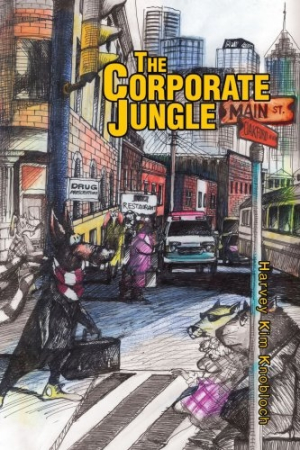The Corporate Jungle
C. S. Lewis’s wardrobe gets a twenty-first-century makeover in this witty and inventive tale.
People using closets to gain access to other worlds is a trope at least as old as C. S. Lewis’s The Lion, the Witch, and the Wardrobe. Harvey Kim Knobloch’s delightful novel, The Corporate Jungle, updates this trope of closet-as-transport-device for the twenty-first century. Although the real intermixes with the fantastical, Knobloch’s witty book touches on themes such as how work affects a man and the importance of following one’s dreams.
Charlie Teezak and Keven Macovoe are in the drudgery of yet another temp job, this one overseen by “the dragon lady and her eunuch,” when they find they can escape tyrannical bosses and boredom using an office closet to transport themselves to “the land of Golden Opportunity,” an African safari where the wildlife is harmless and the women are sexy. Can Charlie and Keven find success in this African fantasyland where straw huts and CD players coexist easily, or will they find themselves trapped in the dull city life they long to flee?
A veteran temp worker himself, Knobloch gets the little details right: the supervisors who micromanage and monitor breaks to the minute, the stifling atmosphere of working in recycled air, and the utter freedom a smoke break brings. Charlie, a likable jokester quick with a quip, who can readily make a cabin out of pencils and fend for himself ably in an African fantasyland, is easy to root for. Keven, a scrawny timid guy who takes a while to gain confidence, takes some more warming up to.
The women are all described as “buxom,” with their beauty continually emphasized. Although written in 2003, all the women are happy to do domestic tasks and moon over babies while the men have adventures. These old-fashioned attitudes do not prevent the women from being strong, though. One, a doctor, tends to an injured man’s genitals without making jokes, another fights off a mugger, and another routinely grabs her husband in affectionate wrestling holds.
In one of the book’s more charming motifs, a lot of humorous situations happen regarding martial arts and “marital arts” (in other words, how to be a good husband): “The basics you need to learn are these: cooking, cleaning, ironing, taking out the garbage, mowing the lawn, babysitting, and lastly kissing.” Although this book was written more than a decade ago, its pages routinely present lasting advice like this in a timeless manner.
While the author’s women seem out of sync with reality, the transitions between African safari and corporate city life remain believable through the author’s constant use of jaunty humor and some well-placed foreshadowing in the beginning. Stumbling blocks include choppy sentences that would flow better if combined, inconsistent comma usage, and back cover copy that fails to mention the whimsical African safari element at all. However, these hiccups are minor in this inventive and redemptive tale.
Reviewed by
Jill Allen
Disclosure: This article is not an endorsement, but a review. The publisher of this book provided free copies of the book and paid a small fee to have their book reviewed by a professional reviewer. Foreword Reviews and Clarion Reviews make no guarantee that the publisher will receive a positive review. Foreword Magazine, Inc. is disclosing this in accordance with the Federal Trade Commission’s 16 CFR, Part 255.

